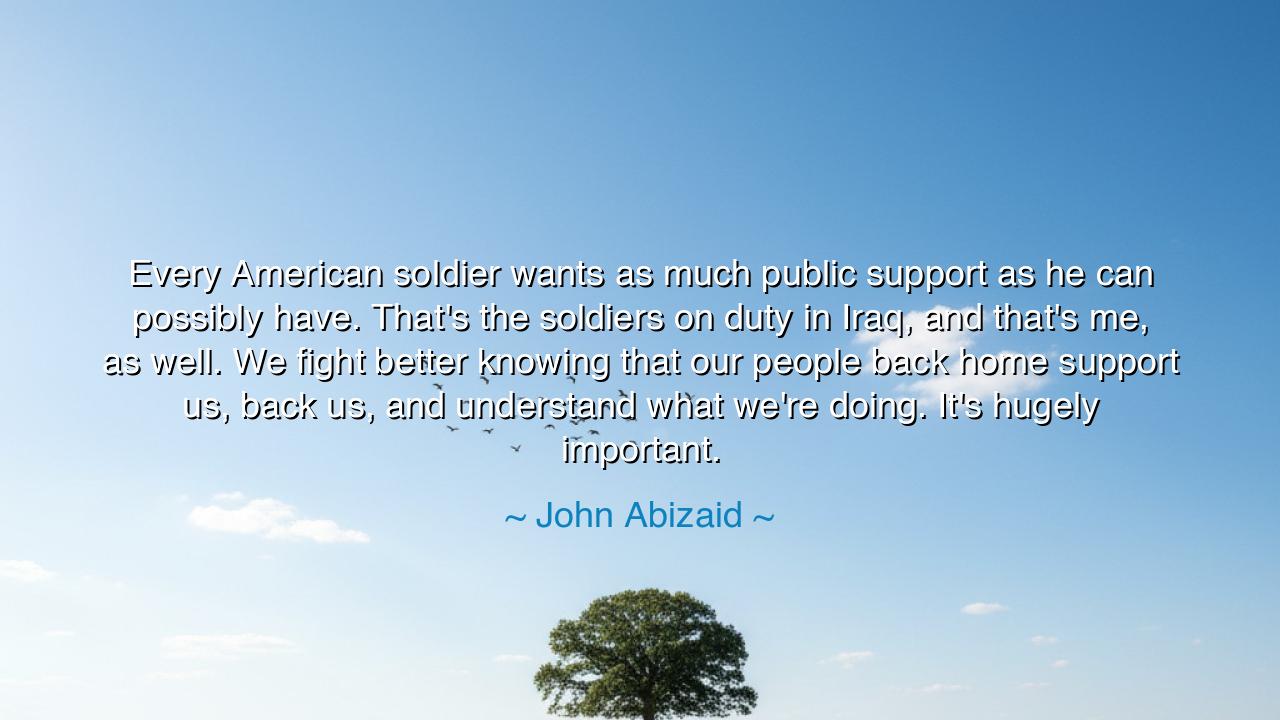
Every American soldier wants as much public support as he can
Every American soldier wants as much public support as he can possibly have. That's the soldiers on duty in Iraq, and that's me, as well. We fight better knowing that our people back home support us, back us, and understand what we're doing. It's hugely important.






Hearken, children of the future, and listen to the words of John Abizaid, who revealed the profound truth that every soldier longs for the support of their people. He spoke not only for himself, but for those who stand vigilant in distant lands, facing danger and uncertainty in service of the nation. In his reflection, we see that courage on the battlefield is intertwined with the understanding and faith of those at home. To fight without the knowledge that one is backed by one’s countrymen is to face the world with half a heart; with support, the spirit is strengthened, the resolve sharpened, and the sense of purpose made clear.
The origin of this insight lies in the timeless relationship between warriors and their communities. Across the ages, from the legions of Rome to the phalanxes of Sparta, soldiers have drawn strength from the belief that their sacrifices are honored and understood by those they protect. Abizaid’s experience as a general in Iraq mirrors this eternal truth: that the valor of the few is sustained by the confidence of the many, and that the morale of the warrior depends as much upon societal trust and recognition as it does upon strategy or weaponry.
Consider the historical example of the American Revolutionary War, where soldiers endured harsh winters, scarcity of supplies, and relentless opposition. The knowledge that families, towns, and fellow citizens supported their struggle for freedom fueled their resilience. The letters of George Washington and the reports from the Continental Army often emphasized the importance of public encouragement, for it was the faith of the people that transformed ordinary men into heroic defenders of liberty. In this light, Abizaid’s words resonate as a modern echo of a universal principle: warriors fight best when the hearts of their countrymen march with them.
Abizaid’s reflection also illuminates the moral dimension of support. It is not merely applause or acknowledgment that sustains the soldier, but understanding—the recognition of the burdens, dangers, and moral weight carried by those who risk life and limb for the nation. When a soldier feels backed by a society that comprehends the stakes, their sense of duty becomes intertwined with honor, purpose, and commitment. Support transforms courage into sustained valor, fortifying the spirit against fear, fatigue, and despair.
In the modern era, we see this principle in the homefront efforts during the Gulf War and subsequent conflicts. Communities that sent letters, provided care packages, and participated in public displays of respect offered soldiers the invisible yet powerful armor of societal affirmation. Generals and enlisted men alike knew that the consciousness of the people’s support could tip the scales between faltering and resolute determination. Abizaid’s words remind us that the warrior’s strength is not solitary; it is a dialogue between duty and the faith of the nation.
From this reflection flows a practical lesson: honor those who serve, understand their burdens, and offer not empty words but meaningful recognition and support. Engage with the realities of sacrifice, and cultivate empathy for those who place themselves in harm’s way for the sake of collective safety. In doing so, you sustain the warriors’ courage, reinforcing the sacred bond between citizen and soldier, duty and gratitude, service and society.
Furthermore, the wisdom of Abizaid calls upon leaders and citizens alike to maintain clarity and communication. Soldiers fight better when the purpose of their service is understood, when the people back home comprehend the stakes and the vision that guides their actions. Encourage awareness, foster civic responsibility, and ensure that those who bear the burdens of defense feel the intangible strength of shared understanding. This support becomes a moral force, amplifying both courage and efficiency in the service of the nation.
Thus, children of tomorrow, inscribe upon your hearts this eternal truth: the courage of a soldier is magnified when sustained by the faith, support, and understanding of the people they protect. Let your gratitude be expressed in deeds, your recognition in presence, and your understanding in contemplation. For it is this sacred communion between those who serve and those who stand behind them that preserves honor, strengthens resolve, and ensures that the fires of duty burn brightly across the generations, as John Abizaid so eloquently proclaimed.






AAdministratorAdministrator
Welcome, honored guests. Please leave a comment, we will respond soon